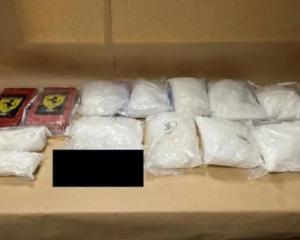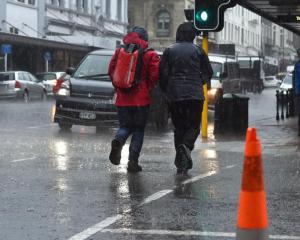
Environment Minister David Parker today announced a phase-out programme starting late next year, targeting food and drink packaging made from PVC and polystyrene, along with some degradable plastic products.
Also to go are single-use plastic items, including drink stirrers, cotton buds, single-use produce bags, cutlery, plates and bowls, straws and fruit labels.
Parker said these types of plastics often ended up as waste in landfills and caused pollution in our soils, waterways and in the ocean.
Products that contained pro-degradant additives, such as oxo-degradable and photo degradable plastics, had also been targeted because they contained additives that made the items break down faster.
This plastic quickly fragments into smaller pieces known as microplastics, which are a scourge for ocean pollution.
Oxo-degradable and photodegradable plastics also can't be composted or recycled and are another source of contamination for our recycling system.
"Phasing out unnecessary and problematic plastics will help reduce waste to landfill, improve our recycling system and encourage reusable or environmentally responsible alternatives," Parker said.
Kiwis on average each throw away an estimated 159 grams each day and are among the biggest waste-creators in the world.
New Zealand households churn through some 1.76 billion plastic containers alone each year, and a recent survey also found nearly 100 million plastic drink and milk bottles were going into rubbish bins instead of being recycled.
Parker said the public had signalled support for an "urgent change" in how plastic was used here.
More than 8000 businesses responded to consultation on proposals put out last year.
"We have made good progress over the past three years and there is strong public and business support for the 2019 plastic bag ban," he said.
"That meant over one billion fewer plastic bags have ended up in landfills or the ocean – and we know New Zealanders are ready to do more.
"We estimate this new policy will remove more than two billion single-use plastic items from our landfills or environment each year."

"The timeframe for the phase-outs strikes a balance between the public call for urgent action and the time needed for businesses to adjust and for replacement products to be found," Parker said.
"We're encouraging businesses and people to find reusable options. We know alternatives are readily available including recyclable plastic or paper-based containers."
Public consultation demonstrated further work is needed on single-use cups and certain types of expanded polystyrene used to transport cold items or protect large items.
Parker said there also appeared to be strong support for taking action on coffee cups and wet wipes.
"The Government will work with industry and other stakeholders to develop a plan for these items and we expect to make a decision on next steps in 2022," he said.
"Plastic straws are a particular area of concerns, and we are committed to phasing them out, but work is needed to ensure that does not have a detrimental impact on those who need to use them."
Taking action to minimise waste and problem plastics is part of the Cooperation Agreement between the Labour and Green parties.
The Government has also launched the $50 million Plastics Innovation Fund to help support projects that reimagine how we make, use and dispose of plastics.
"The fund will help tap into our collective ingenuity to find ways to use less plastic, and make what we do use recyclable for the benefit of the environment – while also boosting jobs and supporting the economic recovery."
Funding would be available for innovative projects from designing out waste in products and packaging, or adopting and scaling up existing technologies, through to switching materials and developing recycling solutions not currently available.
"We expect the fund, which opens in November 2021, will attract a wide range of applicants from research institutes and businesses as well as sector groups, communities, and Māori organisations," Parker said.
"We are moving Aotearoa New Zealand one step closer towards a low-waste, low-emissions circular economy."
Foodstuffs - owner of PAK'nSAVE, New World and Four Square – has already begun the process of removing single use plastic produce bags from across its supermarkets.
The company said customers could expect to see a range of trial products hitting the shop floor as part of this move including nylon and polyester mesh bags, organic cotton reusable bags and collapsible crates.
Chief executive Steve Anderson pointed to survey data showing that environment, plastic and packaging are among the top 10 concerns for Kiwis.
The company's own research had found 30 per cent of our customers were already reusing bags for produce and 66 per cent were expecting to go reusable in produce soon.
"So, we feel shoppers are ready to embrace this change."
Plastics NZ chief executive Rachel Barker said plastic packaging manufacturers had also already been moving away from the problematic materials covered under the announcement.
"This has been seen in the rapid decline of EPS meat-trays and the dramatic reduction of PVC food packaging within our system over the last few years," she said.
"The local industry is ready for these changes."
Barker noted that these phaseouts were necessary for New Zealand to successfully transition to a circular plastics economy where our packaging materials are captured and remanufactured onshore.
"We have a strong plastics manufacturing sector in New Zealand that can utilise recyclable plastic packaging," she said.
"The removal of the problematic materials from kerbside collections means less contamination for local recyclers to deal with, and a higher quality for remanufacture."
University of Auckland physical chemistry professor Duncan McGillivray said the new bans were a "sensible response" to our growing awareness of the persistence of plastic waste in the environment.
"We are only at the beginning of understanding the effects of this waste on our sea life and ourselves, but it is clear that so far the only reliable solution is to prevent the release of problematic plastic waste in the first place."
Greenpeace similarly welcomed the move, but called for a wider ban covering a wider range of products, including single-use plastic drink bottles like Coke, Pepsi and Pump.
"This new commitment to phase out single-use plastics is a win for nature and a win for people power - but it needs to go further if we are to have any hope of averting the plastic pollution crisis," said the group's plastics campaigner, Juressa Lee.
Greenpeace's petition to "ban the bottle" now had more than 80,000 signatures and the group was vowing to renew its efforts to eliminate throwaway plastic bottles.
Timeline
Plastics will be phased-out under the Waste Minimisation Act 2008 in three stages:
• Late 2022: PVC meat trays, Polystyrene takeaway packaging, EPS grocery packaging, degradable plastic products – such as oxo and photo degradable ones - plastic drink stirrers, plastic stemmed cotton-buds.
• Mid 2023: Single-use plastic produce bags, plastic tableware (plates/bowls/cutlery), plastic straws, non-compostable produce labels.
• Mid 2025: All other PVC and polystyrene food and beverage packaging.
Comments
It would be good if the government could put a little bit of effort into sorting out effective recycling. At the moment it is a sick joke. Good on China for saying they don't want our rubbish now we just need to NZ govt to pull its finger out and ensure it doesn't just go into landfill. They are a wonderful example of the Kiwi 'can't do' attitude.












